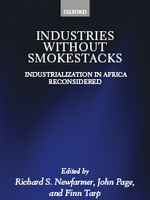Filter by...
Reset all
Publications (334)

– Economic policies that could make a difference
Turmoil following presidential and parliamentary elections in Mozambique has been severe. Preliminary official results from the 2024 elections indicated a landslide win by the ruling party, Frelimo. These results are widely contested, with various reports of irregularities.Post-election squabbles...

Apesar dos esforços desenvolvidos a nível mundial para formalizar as empresas, a maioria continua a operar informalmente. Dados recentes de 2022 indicam que 8 em cada 10 empresas a nível mundial continuam a ser informais. Os defensores das políticas de formalização na Organização Internacional do...

Despite global efforts to formalize enterprises, the majority still operate informally. Recent data from 2022 indicates that 8 out of 10 enterprises globally remain informal. Advocates for formalization policies at the ILO and OECD argue that it benefits firms, workers, and governments.In Mozambique...

Effective social protection programmes that meet local needs can significantly enhance wellbeing and break the cycle of structural poverty among the poor and vulnerable. Measuring their effectiveness and understanding their impact is crucial for policymakers involved in their design. The Vulnerable...
Working Paper
pdf
In this paper, I show that the trend in spatial inequality in Mozambique almost entirely explains the outstanding surge in inequality in the country over the past decade, as well as its decline immediately after the pandemic, in contrast to its secondary role in the earliest years. For this analysis...
Journal Article
This peer-reviewed research is available free of charge. UNU-WIDER believes that research is a global public good and supports Open Access.
After decades of war, Mozambique experienced sustained economic growth and poverty reduction from the mid-1990s. However, these positive dynamics started to revert from 2015. Meanwhile, inequality stagnated in the period 1996/97–2008/09, before markedly increasing afterwards. In this study, we...

Mozambique ranks in the bottom 20 of the human development index, with nearly two-thirds of its population (18.9 million people) living below the USD 0.70-a-day national poverty line. Simultaneously, the country struggles to finance public spending and consistently runs state budget deficits...
Blog
– Dois poemas de Neide Sigaúque
Aqui não dá para dormir, quanto mais para sonharSou a Neide Sigaúque,mulher,oriunda do leito Austral do terceiro mundo,Moçambique, terra de boa gente.Nasci num país independente.Independente da luta de libertação dos meus pais,mas dependente de ajuda externa do ocidente.Um país com economia pendente...
Blog
On 15 May, poet Neide Sigaúque was commissioned to perform two poems on the themes of the WIDER Development Conference The world at crossroads – securing the future generations held in Maputo, Mozambique.One cannot sleep here, let alone dream I am Neide Sigaúque,A womanfrom the southern side of the...
Report
pdf
This report documents MOZMOD, the SOUTHMOD model developed for Mozambique. This work was carried out by the Ministry of Economy and Finance of Mozambique in collaboration with the project partners. The results presented in this report are derived using MOZMOD version 3.0, which is part of the...
Journal Article
This peer-reviewed research is available free of charge. UNU-WIDER believes that research is a global public good and supports Open Access.
– Experimental evidence from Mozambique
THIS ARTICLE IS ON EARLY VIEW | This study examines the impact of digital labor-market platforms on jobs outcomes using a randomized encouragement design embedded in a longitudinal survey of Mozambican technical-vocational college graduates. We differentiate between platforms targeting formal jobs...

In Mozambique, analysing how and why food prices change is crucial. Understanding the dynamics of price formation is fundamental to mitigate the adverse effects of price volatility to the economy. Detailed data on the prices of key food items in Mozambique is, however, limited in both quantity...
Journal Article
This peer-reviewed research is available free of charge. UNU-WIDER believes that research is a global public good and supports Open Access.
– Evidence from the Sena Sugar Estates, 1920–74
ARTICLE IS ON EARLY VIEW | Forced wage labour (FWL) in colonial-era Portuguese Africa came to encompass a majority of working age men and persisted until the early 1960s. On the basis of reconstructed financial records from the Sena Sugar Estates in today's Mozambique, we estimate the long-run...
Working Paper
pdf
– Does labour market information speed job-taking in Mozambique?
High youth unemployment rates and long school-to-work transition times pose a threat to low-income countries’ sustainable growth prospects. Using a randomized control trial experiment conducted in Mozambique, we find strong evidence that providing information on wages and unemployment reduces the...
Working Paper
pdf
We examine the long-term impact of forced labour on individual risk behaviour and economic decisions. For that, we focus on a policy of coercive cotton cultivation enforced in colonial Mozambique between 1926 and 1961. We combine archival sources about the boundaries of historical cotton concessions...
Working Paper
pdf
Budget reliability is the first pillar of Public Expenditure and Financial Accountability (PEFA). In this study, we construct an expansion of the PEFA government response accuracy indicator and test its decomposition, with an application to the government budgets and state general accounts of...
Journal Article
– Evidence from the COVID-19 pandemic in Mozambique
ARTICLE IS ON EARLY VIEW | Digital labour platforms have grown five-fold over the past decade, enabling significant expansion of gig work worldwide. We interrogate the critique that these platforms tend to amplify aggregate shocks for registered workers. Based on the universe of records from a...
Blog
– Report from the 2023 IGM Annual Conference
More than 70% of the Mozambican population depends on subsistence agriculture. As such, the agriculture sector is undoubtedly of fundamental importance to the country’s wellbeing. It has enormous potential to reduce poverty, promote food security, and generate income and employment. Despite its...
Journal Article
This peer-reviewed research is available free of charge. UNU-WIDER believes that research is a global public good and supports Open Access.
Biased beliefs about future labor-market earnings are commonplace. Based on a longitudinal survey of graduate work transitions in Mozambique, this study assesses the contribution of employment mismatches to a large positive gap between expected (ex ante) and realized (ex post) earnings.Accounting...
Working Paper
pdf
– Evidence from Mozambique
The political consequences of economic inequality have been debated in academic and policy circles for centuries. The nature of this relationship seems highly dependent on specific contexts, with empirical studies showing mixed evidence on how economic inequality affects voting and other forms of...
Working Paper
pdf
Following the abolition of slavery, various forms of compulsory labour were adopted by colonial powers to develop their economies. This paper analyses the contemporary consequences of compulsory cotton production—a forced labour system that operated in colonial Mozambique from 1926 to 1961. During...
Working Paper
pdf
– Evidence from Mozambique
Using a unique panel survey of final-year undergraduates at six of the largest universities in Mozambique, we study the wage premium associated with completing an undergraduate degree. Conditional on a very rich set of controls, including pre-degree earnings, objective measures of ability, and...
Working Paper
pdf
– A bird’s eye view based on existing databases
Using publicly available databases and drawing on a wide range of indicators, this paper reviews the institutional performance of Mozambique across seven broad categories: rule of law and judicial independence; voice and freedom of expression/association; political participation; accountability and...
Working Paper
pdf
– Examining socio-psychological characteristics and information provision
Worldwide, enterprises are hit by disasters such as cyclones and floods. Despite being impacted negatively, most enterprises do not prepare for future disasters. This study aims at understanding the determinants of enterprises’ disaster preparedness. It first examines whether specific socio...
Book Chapter
This peer-reviewed research is available free of charge. UNU-WIDER believes that research is a global public good and supports Open Access.
From the book:
Mozambique at a Fork in the Road
Book Chapter
This peer-reviewed research is available free of charge. UNU-WIDER believes that research is a global public good and supports Open Access.
From the book:
Mozambique at a Fork in the Road
Book Chapter
This peer-reviewed research is available free of charge. UNU-WIDER believes that research is a global public good and supports Open Access.
– The Restricted Capacity of the Judicial System
From the book:
Mozambique at a Fork in the Road
Book Chapter
This peer-reviewed research is available free of charge. UNU-WIDER believes that research is a global public good and supports Open Access.
From the book:
Mozambique at a Fork in the Road
Book Chapter
This peer-reviewed research is available free of charge. UNU-WIDER believes that research is a global public good and supports Open Access.
From the book:
Mozambique at a Fork in the Road
Book Chapter
This peer-reviewed research is available free of charge. UNU-WIDER believes that research is a global public good and supports Open Access.
From the book:
Mozambique at a Fork in the Road
Book Chapter
This peer-reviewed research is available free of charge. UNU-WIDER believes that research is a global public good and supports Open Access.
– Institutional Causes
From the book:
Mozambique at a Fork in the Road
Book Chapter
This peer-reviewed research is available free of charge. UNU-WIDER believes that research is a global public good and supports Open Access.
From the book:
Mozambique at a Fork in the Road
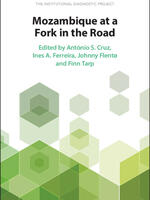
– The Institutional Diagnostic Project
Few countries have experienced as many political and economic changes as Mozambique. A vast and diverse country, it faced a particularly difficult start after a long period of colonial dominance followed by a deadly war that formally ended only in 1992. However, despite impressive growth after multi...
Working Paper
pdf
– A comparative perspective
We examine the distributional effects of the COVID-19 pandemic and associated tax-benefit measures in seven sub-Saharan African countries, focusing on the onset of the crisis.We evaluate impacts on disposable incomes, considering variations across income groups; assess the effectiveness of tax...
Working Paper
pdf
– A social accounting matrix approach
This study makes use of Mozambican social accounting matrices (SAMs) for the years 2007 and 2019, which we compare to uncover structural changes. Our findings reflect the significant short- and long-term challenges that Mozambican policy makers face. Broad-based dynamic change and structural...
Journal Article
This peer-reviewed research is available free of charge. UNU-WIDER believes that research is a global public good and supports Open Access.
– Evidence from Mozambique
We examine how returns to education have evolved in the context of post-conflict reconstruction and economic growth in Mozambique over the period 1996–2015. We show that private rates of return to education have declined at lower levels of schooling, but remained stable and possibly even increased...
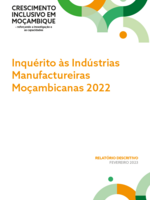
– Relatório final
Este relatório documenta os principais resultados do Inquérito às Indústrias Manufactureiras Moçambicanas 2022 (IIM 2022). O inquérito foi realizado em 2022 no âmbito do programa Crescimento inclusivo em Moçambique (IGM) com apoio do Ministério dos Negócios Estrangeiros da Finlândia e Ministério dos...
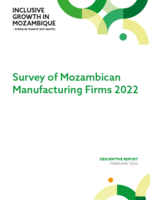
– Final report
This report documents the main findings of the Survey of Mozambican Manufacturing Firms 2022 (IIM 2022). The survey was implemented in 2022 under the Inclusive growth in Mozambique (IGM) programme with the support from the Finnish Ministry for Foreign Affairs and the Norwegian Ministry of Foreign...
Report
pdf
This report documents MOZMOD, the SOUTHMOD model developed for Mozambique. It describes the different tax-benefit policies in place, how the microsimulation model picks up these different provisions, and the database on which the model runs. It concludes with a validation of MOZMOD results against...
Working Paper
pdf
– Evidence from an ethnographic study in Mozambique
This ethnographic study explores the implementation of bilingual education in Mozambique: how it is understood, adapted, and resisted by school directors, teachers, and local officials. Bilingual education uses local languages in early grades before a gradual shift into Portuguese, which most...
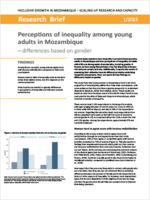
– Differences based on gender
A recent study examines how inequality is perceived among young adults in Mozambique and how perceptions of inequality correlate with different demographic characteristics, including gender. It focuses on how young Mozambicans view the disparities between rich and poor people and why. Additionally...
Journal Article
This peer-reviewed research is available free of charge. UNU-WIDER believes that research is a global public good and supports Open Access.
Mozambique experienced important reductions in the poverty rate until recently, before two major natural disasters hit, an armed insurgency stroke in the northern province of Cabo Delgado, and the country started suffering from a hidden debt crisis with associated economic slowdown. As the last...
Blog
Over the past few months, we have been carrying out extensive research in Mozambique as part of the Inequality and governance in unstable democracies – the mediating role of trust project. The research aims to understand the long-term impacts of cotton concessions —a forced labour system implemented...
Working Paper
pdf
Different concepts of inequality lead to different positions in discussions about whether economic growth leads to increasing inequality. This study investigates how over 1,100 young adults in Mozambique perceive inequality and whether their perceptions are based on relative or absolute terms. It...
Working Paper
pdf
– The case of post-war migration in Mozambique
Internal migration plays an important role in the economic development of individuals, their families, and their country. This study describes Mozambique’s most common migration patterns from 1992 until 2017 using data from three population censuses. We focus on the most important moves between...
Blog
– Key findings from the IGM Annual Conference 2022
Since 2016, the private sector in Mozambique has faced several external shocks, including terrorism in Cabo Delgado, Cyclones Idai and Kenneth, the COVID-19 pandemic, and the Ukrainian conflict and its impact on commodity prices and inflation. What is the state of the Mozambican private sector today...

– The case of Mozambique
Designing and implementing public policies requires caution to guarantee the best use of scarce resources, especially in middle- and lower-income countries. One of the ways to achieve this goal is to simulate the potential tax and benefit impacts of different policies that are under consideration...
Working Paper
pdf
We study the effectiveness of social protection benefits in reducing income and consumption poverty in five sub-Saharan African countries—Ghana, Mozambique, Tanzania, Uganda, and Zambia—in normal times and times of widespread economic crisis. Using tax–benefit microsimulation models with...
Working Paper
pdf
Informal self-employed traders in developing countries are vulnerable to shocks as they often lack access to social insurance or formal finance. This study investigates the impact of the COVID-19 pandemic on these urban traders in the capital of Mozambique, Maputo. Drawing on longitudinal phone...
Working Paper
pdf
This study investigates the short-term impacts of an aggregate socioeconomic shock on household food consumption and children’s nutrition using the case of the COVID-19 pandemic in Mozambique. In response to the economic downturn, households are expected to adjust their food choices both in terms of...
Working Paper
pdf
This study presents and discusses structural features of the Mozambique economy through the lens of a recently constructed 2019 social accounting matrix (SAM). This is an important reality check of the SAM construction process since it brings together various data sources that are not necessarily...
Working Paper
pdf
In this study, we explore the correlates of the employment gender gap among urban youth in Mozambique. Young people are confronted with simultaneous decisions about education, work and family life influenced by social norms around gender roles. Using data from a panel of individuals in 2017 and 2020...
Working Paper
pdf
– 1996/97–2019/20
After decades of war, ending in 1992, Mozambique embarked on a path of sustained economic growth and substantial poverty reduction. However, these positive dynamics started to revert from 2015, with per capita growth rates getting close to zero and household real consumption reducing in all areas of...
Technical Note
pdf
This technical note describes how the 2015 Social Accounting Matrix (SAM) for Mozambique was updated. New Household Budget Survey data availability, changes in the economic structure as captured by the underlying Supply and Use Tables and National Accounts as well as the frequency of previous SAM...
Journal Article
This peer-reviewed research is available free of charge. UNU-WIDER believes that research is a global public good and supports Open Access.
– Evidence from Mozambican job-seekers
Forward-looking expectations are central to job search but often inaccurate. To test whether public information can help correct beliefs, we embed an experiment in a longitudinal survey of Mozambican graduates. We quantify responses of own-earning expectations to information about peers’ current...
Journal Article
This peer-reviewed research is available free of charge. UNU-WIDER believes that research is a global public good and supports Open Access.
– The case of Mozambican firms
In sub-Saharan Africa, many micro and small enterprises do not (or at least only partially) comply with official rules and regulations. Given that low compliance rates impede economic growth and human development, it is essential to identify mechanisms that can help improve abidance with laws. This...
Blog
– Experimental evidence from Mozambique
Digital technologies can be deployed to improve job search, but their effectiveness in practice is disrupted. This column uses experimental data to investigate the effect of a digital job-matching platform on the labour outcomes of young people in Mozambique. The ‘treatment’ of a text message...
Working Paper
pdf
– Evidence from COVID-19
Digital labour platforms have grown five-fold over the last decade, enabling significant expansion in gig work worldwide. We interrogate the criticism that these platforms tend to amplify aggregate economic shocks for registered users (workers). Based on the universe of records from a matching...
Journal Article
This peer-reviewed research is available free of charge. UNU-WIDER believes that research is a global public good and supports Open Access.
– From additive weights to minimal bundles
In the widely-used class of multidimensional poverty measures introduced by Alkire and Foster (2011), dimension-specific weights combined with a single cut-off parameter play a fundamental role in identifying who is multidimensionally poor. This study revisits how these parameters are understood...
Working Paper
pdf
– Labour coercion and trade preferences on the Sena Sugar Estates (1920–74)
The magnitude of returns to colonial-era investments in Africa has been addressed in an extensive literature, as have the nature and legacies of extractive colonial institutions. However, the link between these institutions and the profitability of firms remains unclear. We reconstruct the annual...
Working Paper
pdf
– Experimental evidence from sub-Saharan Africa
Can digital labour market platforms reduce search frictions in either formal or informal labour markets? We study this question using a randomized experiment embedded in a tracer study of the work transitions of graduates from technical and vocational colleges in Mozambique. We implement an...
Journal Article
This peer-reviewed research is available free of charge. UNU-WIDER believes that research is a global public good and supports Open Access.
This study assesses the impact of COVID-19 on household consumption poverty. To predict changes in income and the associated effects on poverty, we rely on existing estimated macroeconomic impacts. We assume two main impact channels: direct income/wage and employment losses. Our simulations suggest...
Journal Article
This peer-reviewed research is available free of charge. UNU-WIDER believes that research is a global public good and supports Open Access.
– A social accounting matrix approach
This study assesses the economic costs of COVID-19 and the state of emergency implemented by the Government of Mozambique. We use a social accounting matrix multiplier analysis to estimate the effects of the pandemic on the economy. Our simulations suggest that the Mozambican economy lost 3.6...
Working Paper
pdf
The subject of this paper is health and ethnic inequalities in Mozambique, with special reference to leprosy. It is argued that the health policies and strategies adopted in the colonial and post-colonial periods led to an unequal distribution not only of certain diseases but also of health...
Report
pdf
View the latest MOZMOD country report here. This report documents MOZMOD, the SOUTHMOD model developed for Mozambique. It describes the different tax-benefit policies in place, how the microsimulation model picks up these different provisions, and the database on which the model runs. It concludes...
Working Paper
pdf
This paper estimates the causal impact of teacher content knowledge on student achievement in Mozambique, a low-income country where a large share of fourth-graders fail to meet the minimum requirements of literacy and numeracy. I use nationally representative data from the Service Delivery...
Technical Note
pdf
Agricultural subsidies may have significant productive and distributional consequences, and policy-makers need to be able to assess these impacts as a part of the overall tax and benefit policy. Microsimulation models offer a tool for such analysis also in developing countries, but their coverage...

Millions of Africans lost their jobs as a result of the coronavirus pandemic, but state social security systems were of little help to people who lost their income.This is the conclusion of a study conducted by the United Nations University World Institute for Development Economics Research, UNU...
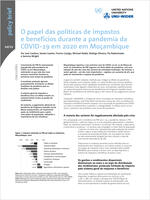
Moçambique reportou o seu primeiro caso da COVID-19 em 22 de Março de 2020. As estimativas do PIB sugerem um forte efeito da pandemia, com uma redução de sete dos nove dos sectores de actividade analisados. No entanto, o sector agrícola – um dos mais importantes – registou um aumento de 9%, que pode...

The next decade is a make-or-break for the world’s most vulnerable countries. To tackle the unprecedented confluence of COVID-19, climate, and economic crises, new solutions are desperately needed. Scientific research is one key for finding long-lasting solutions. Least developed countries (LDCs)...

Mozambique reported its first case of COVID-19 on 22 March 2020. GDP estimates suggest a strong pandemic effect, with a reduction in seven of nine business sectors analysed. However, the agriculture sector, one of the most important, experienced a 9% increase, which may have cushioned the pandemic...

In summer 2020 the SOUTHMOD team set out, with partners, to analyse the impact of government policies on protecting households from getting poorer and avoiding societies from becoming more unequal. Now we are releasing a cross-country comparative study that analyses the distributional effects of the...
Journal Article
This peer-reviewed research is available free of charge. UNU-WIDER believes that research is a global public good and supports Open Access.
A wide range of evidence shows systematic differences in health status among social groups, which are associated with unequal exposure to and distribution of the social determinants of health (SDH). However, the role of these SDH has not been studied extensively in low-income countries, where most...
Working Paper
pdf
This paper analyses the distributional effects of the COVID-19 pandemic and related tax-benefit measures in 2020 in a cross-country comparative perspective for five African countries: Ghana, Mozambique, Tanzania, Uganda, and Zambia. We first estimate the impact of the crisis on disposable incomes...
Report
pdf
View the latest MOZMOD country report here. This report documents MOZMOD, the SOUTHMOD model developed for Mozambique. It describes the different tax-benefit policies in place, how the microsimulation model picks up these different provisions, and the database on which the model runs. It concludes...
Working Paper
pdf
This paper builds on a longitudinal school-to-work transition phone survey experiment to quantify the effects on attrition of communicating with participants. Specifically, we study the impact of sending topically relevant information on job market conditions via SMS at the start of each survey...
Working Paper
pdf
– The Mozambican case
At independence in 1975, the Frelimo government took over public administration from the colonial system and started to transform it. The public financial management (PFM) system was adapted to the central planning and management of the economy in line with nationalist and Marxist-Leninist thinking...
Working Paper
pdf
This paper explores agricultural performance of Mozambique, its institutional weaknesses, and the underlying factors that underpin an unsatisfactory performance during many decades. We point to the role of systemic political instability and violence combined with challenges to state legitimacy...
Working Paper
pdf
– The case of Mozambican firms
Using panel data of manufacturing enterprises in Mozambique between 2012 and 2017, we investigate how changes in perceived quality of governance are related to firms’ law compliance. Controlling for firm-level unobserved heterogeneity, we look at three aspects of governance and their components...
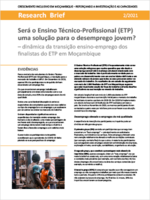
– Dinâmica da transição ensino-emprego dos finalistas do ETP em Moçambique
O Ensino Técnico-Profissional (ETP) é frequentemente visto como uma solução milagrosa que resolve questões que vão desde o desemprego juvenil até à mudança estrutural relacionada com o mercado de trabalho. Isto é particularmente verdade para os países em desenvolvimento com um ensino básico...
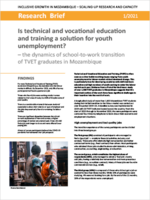
– The dynamics of school-to-work transition of TVET graduates in Mozambique
Technical and Vocational Education and Training (TVET) is often seen as a silver bullet resolving issues ranging from youth unemployment to labour market-related structural change. This is particularly true for developing countries with deficient basic education and high numbers of youth seeking to...

– Relatório Final
Este relatório documenta as principais conclusões do Inquérito à Transiçãoo Ensino-Emprego dos Finalistas do Ensino Técnico-Profissional em Moçambique. A pesquisa foi planificada e implementada por pesquisadores do United Nations University World Institute for Development Economics Research (UNU...

Survey on the school-to-work transition of technical and vocational training graduates in Mozambique
– Final report
This report documents the main conclusions of the Survey on the School-to-Work Transition of Technical and Vocational Education and Training Graduates in Mozambique. The research was planned and implemented by researchers from the United Nations University World Institute for Development Economics...

– Three lessons to inform next steps
At the start of the last decade, Mozambique’s prospects looked stellar. Following from the early 1990s, when peace finally arrived after a devastating and protracted armed conflict, this vast country in Southern Africa could look back proudly on a sustained period of rapid growth and poverty...
Working Paper
pdf
This study assesses the impact of four coal mines in Mozambique on the socioeconomic outcomes of the local population. We combine four waves of household surveys with coal mine locations data and employ a difference-in-difference model. The timing of the surveys allows us to control for pre-trends...
Working Paper
pdf
– 1997–2017
This study seeks to add to the research on inequality in least developed countries, namely in Mozambique, by measuring and mapping indicators of horizontal wealth inequality along geographic regions and ethnolinguistic identities. Using census data for 1997, 2007, and 2017, we identify possible...
Working Paper
pdf
– Practical guidance on measuring intergenerational mobility from a simulation framework
Despite the importance attributed to intergenerational educational mobility in the process of development, there remains little consensus on how mobility should be measured. We present analytical and empirical evidence regarding the sensitivity of alternative estimators to different forms of...
Working Paper
pdf
– Insights from a digital matching platform in Mozambique
Despite the severe negative economic shock associated with the COVID-19 pandemic, evidence from many contexts points to a surge in sales on online platforms, as well as shifts in the composition of demand. This paper investigates how the pandemic has affected both the supply of and demand for...
Working Paper
pdf
This study assesses the impact of the COVID-19 pandemic and the state of emergency implemented by the Government of Mozambique on household consumption poverty. To predict changes in income and the associated effects on poverty and inequality, we rely on macroeconomic impacts estimated by Betho et...
Working Paper
pdf
– A social accounting matrix approach
This study aims to assess the economic costs of COVID-19 and the state of emergency implemented by the Government of Mozambique, relying on a social accounting matrix. It produces numerical results that represent the direct effect on (or ‘shocks’ to) the economy associated with the pandemic. We...
Working Paper
pdf
– Evidence from Idai
Cyclone Idai, the most devastating cyclone ever recorded in Southern Africa, caused havoc in large parts of central Mozambique, especially the port city of Beira, upon its landfall in March 2019. This study reviews and compares measurements of the impact, using various sources of remote sensing data...
Working Paper
pdf
– RCT evidence from Mozambique
In March 2019, Cyclone Idai hit central Mozambique and caused widespread damage, including businesses in the enterprise sector. We use panel data and a randomized controlled trial to estimate the impact of unconditional cash grants on micro enterprises and their recovery. We find that, on average...
Working Paper
pdf
This study investigates how manufacturing companies were affected by tropical Cyclone Idai, which struck Central Mozambique in March 2019. The analysis builds upon a representative sample of 464 enterprises located in the cities of Beira and Chimoio which were interviewed 6 and 12 months after the...
Working Paper
pdf
– Evidence from Mozambique
We examine the link between individual characteristics and sorting into different occupations using data from university students in Mozambique. We provide a comprehensive approach combining the main determinants of occupational sorting identified in the literature in a single framework to test both...

– Simulando diferentes cenários para atualização e expansão do PSSB
O Programa Subsídio Social Básico (PSSB) é um programa de transferência de renda mensal, não condicional, por tempo indeterminado, com o objectivo de reforçar o bem-estar da população pobre e vulnerável. São actualmente elegíveis ao PSSB pessoas em extrema pobreza e vulnerabilidade e agregados...

The negative economic and social impacts of the COVID-19 pandemic in Mozambique range from reduced social interaction to business closures, job losses, and increased poverty. Existing evidence already shows significant effects on the transitions of young people graduating from technical and...

Investments in infrastructure – such as roads – typically aim to reduce transport costs, stimulate trade, and make new production activities viable. Across sub-Saharan Africa, the need for such investments is widely acknowledged. The argument for more and better infrastructure seems fairly...
Journal Article
This peer-reviewed research is available free of charge. UNU-WIDER believes that research is a global public good and supports Open Access.
– Bridging the Zambezi in Mozambique
Historically, transport infrastructure connecting the most agriculturally productive areas of Mozambique and the richer southern region has been poor. A primary bottleneck was an unreliable ferry service over the Zambezi river, addressed by construction of a road bridge in 2009. In this study we...
Working Paper
pdf
– A validation exercise and an application to cross-sectional survey data
In this paper we first validate the use of the synthetic panels technique in the context of the 2014/15 intra-year panel survey data for Mozambique, and then apply the same technique to the 1996/97, 2002/03, 2008/09, and 2014/15 cross-sectional household budget surveys for the same country. We find...

– Simulações dos efeitos de uma pensão para cobertura universal de velhice em Moçambique
Moçambique apresenta instrumentos legais que visam directa ou indirectamente reduzir a vulnerabilidade das pessoas idosas. Com efeito, há cerca de duas décadas, o país aprovou através da Resolução n.º 84/2002 de 12 de Novembro, a Política para a Pessoa Idosa e a estratégia da sua implementação...

– Reflections from the annual conference of the Inclusive growth in Mozambique programme
Like many developing countries, Mozambique is struggling with problems of poverty, inequality, low productivity, unemployment, and low institutional capacity. The COVID-19 pandemic is now adding to these challenges. Finding solutions hinges on examining, understanding, and building the evidence that...
Working Paper
pdf
Plastics are ubiquitous across the region and play an important role in multiple industries. Most plastic products are based on a value chain that is grounded in petroleum refining, posing an environmental challenge. Plastic manufacturing in South Africa suffers from the high cost of polymers as...
Journal Article
This peer-reviewed research is available free of charge. UNU-WIDER believes that research is a global public good and supports Open Access.
– Assessing the short-term impact on consumption and poverty of the 2015 flood in Mozambique
Mozambique is among the most disaster-prone countries in the world. A bigger than usual, and mostly unexpected, flood occurred in the central-northern region of the country in the first few months of 2015, causing huge damage to infrastructures. In this study, we use a nationally representative...
Journal Article
This peer-reviewed research is available free of charge. UNU-WIDER believes that research is a global public good and supports Open Access.
We analyse the multidimensional wellbeing of children aged 0–17 in Mozambique and find that 46.3% can be considered multidimensionally poor. A substantial divide exists between urban and rural areas and between northern and southern provinces. We compare Mozambican children’s wellbeing with that of...
Working Paper
pdf
Mozambique is among the world’s least complex economies. By systematically accounting for both supply- and demand-side factors, we identify new products and sectors that can help to diversify and upgrade its economy. In a supply-side analysis, we use network methods from the literature on economic...
Working Paper
pdf
– The effect of peer salary information on own-earnings forecasts
How jobseekers set their earnings expectations is central to job search models. To study this process, we track the evolution of own-earnings forecasts over 18 months for a representative panel of university-leavers in Mozambique and estimate the impact of a wage information intervention. We sent...
Working Paper
pdf
In the light of Mozambique’s natural resources boom—especially its large-scale investments in mining, oil, and gas—this paper analyses the prospects for the extractive industries to contribute to economic transformation from an institutional perspective. To this purpose, we address the institutional...
Working Paper
pdf
As a sovereign country, Mozambique initially relied on international solidarity and managed its donor relations well. Donor dependency entailed some loss of agency for the government as it allowed donors to challenge its capacity but never its authority. However, in the last decade, donor countries...
Working Paper
pdf
The rule of law and judicial independence are a project yet to be achieved in Mozambique. The different attempts made so far to reform the legal system, mainly after the change in political and strategic direction brought about by the Constitution of 1990, were always short-sighted and conjunctural...
Working Paper
pdf
– Factors affecting public financial management
Mozambique has achieved incipient but still fragile socio-economic development since 1975. The public financial management system has been reformed and improved, but its performance has weakened since 2013. Applying an institutional economics approach, we have identified the economic growth strategy...
Working Paper
pdf
– The role of institutions in the definition of results
With the introduction of the economic reforms in the late 1980s, the opening up of the political arena and the end of the civil war in the early 1990s, the decentralization process began in Mozambique. Different research developed in recent years shows that, as is the case in other countries in sub...
Working Paper
pdf
– The Mozambique case
The central aim of this text is to show the impact institutions have on the performance of the health sector in Mozambique. The text shows that of the social determinants of health, institutions play a central role in the performance of the Mozambican health sector—and, through it, economic and...
Working Paper
pdf
– From access to epistemic quality in primary education
From the early days of national independence in 1975, the central aim of the educational policy in Mozambique has been to ensure that all school-age children have access to school and can remain there until they have completed their basic education. In the pursuit of this aim, the extension of...
Working Paper
pdf
The financial inclusion effort achieved positive results, with the number of Mozambicans having access to banking services increasing considerably, particularly after 2011–12. However, the economic and social impact was limited, considering that farm productivity has remained low and poverty levels...
Working Paper
pdf
This paper is a review of the institutions and the performance of the agricultural sector in Mozambique, using an analysis table adapted to the assessment of the connections between the institutions and economic development. In the first part, information is presented on the performance of the...
Blog
– In their own words
Across Mozambique, 1,600 secondary school graduates from technical and vocational (TVET) institutes are being tracked as part of the school-to-work transition survey of the Inclusive growth in Mozambique programme — the country’s first long-term study in this area. Back in January, I conducted in...
Blog
– The impact of COVID-19 on the transition of young Mozambicans from school to work
Since appearing in 2019, the COVID-19 pandemic has plunged the world into an unprecedented health and socioeconomic crisis. In response, during the second half of March 2020, the government of Mozambique enacted several measures (in force until now) to guarantee social distancing, with the aim of...
Journal Article
This peer-reviewed research is available free of charge. UNU-WIDER believes that research is a global public good and supports Open Access.
In this study, I quantify the contribution of a subpopulation to inequality. This is defined as the sum of the contributions of its members, with these contributions computed as the impact on inequality of a small increase in the population mass at each point of the distribution (using the...
Working Paper
pdf
– What explains behavioural dishonesty in low-income countries?
We run a lab-in-the-field experiment with 1,060 university students in Mozambique to examine the correlates of behavioural dishonesty, distinguishing between intrinsic and extrinsic factors. Using an incentivized dice game, which yields direct estimates of the propensity to cheat, we find that the...

– A snapshot of Mozambique in 2015–2018
After decades of war and conflict, Mozambique and its economy experienced a strong recovery from the 1990s into the 2000s. However, between 2015 and 2018 multiple crises unfolded in Mozambique — the economic crisis and the scandal of hidden debt, severe weather shocks, and increasing violence in the...
Working Paper
pdf
– Gender inequality in salary expectations of university students
Students’ expectations about their future wages are established in the literature as relevant determinants of the choices made for education progression and, at the university level, for the area and course to be studied. In this paper, the first comparable analysis in sub-Saharan Africa, we examine...
Working Paper
pdf
Mozambique experienced important reduction in the poverty rate until recently, before two major natural disasters hit and the country started suffering from a hidden debt scandal with associated economic slowdown. As the last available national household expenditure survey is from 2014/15, just...
Blog
Technical and vocational education and training (TVET) is often put forward as the solution to youth unemployment — but to prove its worth, better evidence is needed. A new survey tracking over 1,600 TVET graduates as they enter the world of work, the first of its kind in Mozambique, sets out to...

– Baseline survey on the school-to-work transition of technical and vocational education graduates in Mozambique (in Portuguese)
A investigação aqui apresentada foi planeada e implementada por pesquisadores do United Nations University World Institute for Development Economics Research (UNU-WIDER), do Grupo de Pesquisa em Economia do Desenvolvimento (DERG) da Universidade de Copenhaga (UCPH), do Centro de Estudos de Economia...

– Inquérito de base à transição ensino-emprego dos graduados do ensino técnico-profissional em Moçambique
The research detailed herein was planned and implemented by researchers at the United Nations University World Institute for Development Economics Research (UNU-WIDER), the Develop-ment Economics Research Group (DERG) at the University of Copenhagen (UCPH), the Centre for Economics and Management...

As the COVID-19 virus has spread across the globe, developing countries are starting to enact many of the same policies used in China, Europe, and North America to contain the virus. But are these policies appropriate in low income contexts? To help think about this we propose a simple index of...

We calculated a lockdown readiness index for Mozambique and the results don’t look good. If lockdown policies are needed to halt the spread of the virus, the government will also need to take extraordinary measures to provide a minimum of basic services for people living under a lockdown. They...

View the latest MOZMOD country report here. This report documents MOZMOD, the SOUTHMOD model developed for Mozambique. The report describes the different tax-benefit policies in place, how the microsimulation model picks up these different provisions, and the database on which the model runs. It...
Working Paper
pdf
– Explaining the gap between expected and realized graduate earnings in Mozambique
Inaccurate expectations of future wages are found in many contexts. Yet, existing studies overwhelmingly refer to high-income countries, and there is little evidence regarding the sources of expectational errors.Based on a longitudinal survey of graduates from the six largest universities in...

– Relatório Final do Inquérito à Transição Ensino-Emprego dos Finalistas Universitários
This report documents the main findings of the Survey of School-to-Work Transitions ofUniversity Students.The research was planned and implemented by researchers at the UnitedNations University World Institute for Development Economics Research (UNU-WIDER), theDevelopment Economics Research Group...

From the book:
Mining for Change

This report documents the main findings of the Survey of School-to-Work Transitions of University Students. The research was planned and implemented by researchers at the United Nations University World Institute for Development Economics Research (UNU-WIDER), the Development Economics Research...
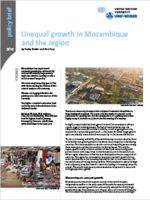
There is an increasing interest in the analysis of economic inequalities in least developed countries. This is not only the result of a general social preference for equality, but also the consequence of a growing sense that highly unequal societies may distort the functioning of a country...
Working Paper
pdf
– Impact of food, soft drinks, and coffee on cognitive and non-cognitive test scores
Cognitive and non-cognitive tests are key factors in many aspects of economics, especially within labour market analysis. Non-cognitive tests and personality traits are increasingly used, as these are found to be as critical as cognitive abilities for labour market outcomes, while they might be more...
Working Paper
pdf
Using convolutional neural networks applied to satellite images covering a 25 km x 12 km rectangle on the northern outskirts of Greater Maputo, we detect and classify buildings from 2010 and 2018 in order to compare the development in quantity and quality of buildings from before and after...
Working Paper
pdf
– An economy-wide perspective
The recent discovery of large fields of natural gas in Mozambique has led to great international interest and expectations of future gains. However, many resource-rich countries have struggled to achieve long-term sustainable growth, whether because of poor management, unequal outcomes, or political...

– Key findings from an extensive survey
This brief summarizes the findings and implications of a survey of the school-to-work transition by Mozambican university students. No research of this kind had previously been conducted. Over the course of a year and a half, university graduates were monitored in their transition to the labour...

– Final report on the survey on the education-employment transitions of university finalists (in Portuguese)
Este relatório documenta as principais conclusões do Inquérito à Transição Ensino-Emprego dos Finalistas Universitários. A pesquisa foi planificada e implementada por pesquisadores do United Nations University World Institute for Development Economics Research (UNU-WIDER), o Grupo de Pesquisa em...

Sitting in front of a class of 20 young students at a private technical-vocational college on the edge of Maputo, the capital city of Mozambique, I cannot help but reflect on the fervent social media debates regarding the Royal Swedish Academy of Sciences award of the 2019 Nobel Prize in economics...
Working Paper
pdf
– A 2015 social accounting matrix multiplier decomposition approach for Mozambique
This paper considers the impact of agriculture and international trade development on income distribution and economic activity in Mozambique. A social accounting matrix multiplier decomposition model is used—in particular, an extension of the standard model that details the process of income...

View the latest MOZMOD country report here. This report documents MOZMOD, the SOUTHMOD model developed for Mozambique. This work was carried out by the Ministry of Economy and Finance of Mozambique in collaboration with the project partners in the scope of the SOUTHMOD project. The results presented...

What does it mean to be poor? On the face of it, this may not sound like a very difficult question. In developed countries, almost all official and everyday definitions refer to poverty in income terms. In this sense, low consumption power (income) and poverty are essentially synonymous. Outside of...
Working Paper
pdf
– From deprivation weights to bundles
In the widely used class of multidimensional poverty measures introduced by Alkire and Foster (2011), dimension-specific weights combined with a single cut-off parameter play a fundamental role in identifying who is multidimensionally poor. This paper revisits how these parameters are understood...
Journal Article
This peer-reviewed research is available free of charge. UNU-WIDER believes that research is a global public good and supports Open Access.
– Implications for Gender Inequalities Within and Across Rural Households
Part of Journal Special Issue
Inequalities in the least developed countries
Journal Article
This peer-reviewed research is available free of charge. UNU-WIDER believes that research is a global public good and supports Open Access.
Part of Journal Special Issue
Inequalities in the least developed countries
Journal Article
This peer-reviewed research is available free of charge. UNU-WIDER believes that research is a global public good and supports Open Access.
– The Case of Mozambique
Part of Journal Special Issue
Inequalities in the least developed countries
Journal Article
This peer-reviewed research is available free of charge. UNU-WIDER believes that research is a global public good and supports Open Access.
Part of Journal Special Issue
Inequalities in the least developed countries
Journal Article
This peer-reviewed research is available free of charge. UNU-WIDER believes that research is a global public good and supports Open Access.
Part of Journal Special Issue
Inequalities in the least developed countries
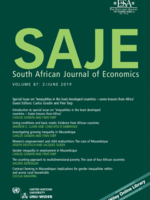
– Some lessons from Africa
This special issue comprises six papers analysing different dimensions of inequalities in African countries. Three papers deal with the trend in inequality in consumption in Mozambique, with multidimensional poverty in four sub‐Saharan countries, and with the relationship between living conditions...
Working Paper
pdf
– Assessing the short-term impact on consumption and poverty of the 2015 flood in Mozambique
Mozambique is among the most disaster-prone countries in the world. A bigger than usual, and mostly unexpected, flood occurred in the central-northern region of the country in the first few months of 2015, causing huge damage to infrastructures. In this paper, we use a nationally representative...
Working Paper
pdf
The level of educational attainment in Mozambique is one of the lowest in the world and primary school completion rate is also very low, not reaching 40 per cent. Using data from the Mozambican Household Budget Survey 2014/15, we study (1) the determinants of school dropout; (2) the variables that...
Journal Article
This peer-reviewed research is available free of charge. UNU-WIDER believes that research is a global public good and supports Open Access.
Part of Journal Special Issue
Bioenergy in Southern Africa
Journal Article
This peer-reviewed research is available free of charge. UNU-WIDER believes that research is a global public good and supports Open Access.
Part of Journal Special Issue
Bioenergy in Southern Africa
Journal Article
This peer-reviewed research is available free of charge. UNU-WIDER believes that research is a global public good and supports Open Access.
Part of Journal Special Issue
Bioenergy in Southern Africa
Journal Article
This peer-reviewed research is available free of charge. UNU-WIDER believes that research is a global public good and supports Open Access.
– Investigating the qualitative-quantitative divide in Mozambique
Motivated by the siloed nature of much poverty research, as well as the challenge of finding inclusive operational definitions of poverty, this study reflects on the merits of seeking to reconcile economic (quantitative) and anthropological (qualitative) analytical approaches. Drawing on detailed...
Working Paper
pdf
– Perspectives on the social determinants of health in Mozambique
The social determinants of health have not been studied extensively in low-income contexts, where most studies focus on access to medical care. We undertake a retrospective cross-sectional analysis of the social determinants of health in Mozambique for the 2002–14 period, covering 258,431...

At the beginning of this decade, large offshore natural gas fields were discovered in north-east Mozambique. Investment is now flowing into the country, and a boom in the natural gas sector is expected. According to estimates from Mozambique’s Ministry of Economy and Finance, additional tax revenues...

At the beginning of this decade, large offshore natural gas fields were discovered in north-east Mozambique. Investment is now flowing into the country, and a boom in the natural gas sector is expected. According to estimates from Mozambique’s Ministry of Economy and Finance, additional tax revenues...

At the beginning of this decade, large offshore natural gas fields were discovered in north-east Mozambique. Investment is now flowing into the country, and a boom in the natural gas sector is expected. According to estimates from Mozambique’s Ministry of Economy and Finance, additional tax revenues...
Journal Article
This peer-reviewed research is available free of charge. UNU-WIDER believes that research is a global public good and supports Open Access.
– Evidence from Mozambique
The impact of commercial farms on smallholders in developing countries remains highly controversial. This study draws on four periods of investments in commercial farming in Mozambique to frame an empirical analysis of their contemporary economic spillovers. We investigate the degree of selection of...
Blog
Mozambique is still an agriculture-based economy. Huge offshore gas fields have been discovered in the country and plans for gas projects are in the process. However, one day the gas explorations will come to an end. What does this mean for the rest of the economy? On 28 November, our Inclusive...
Working Paper
pdf
The latest firm survey of Mozambique, the Inquerito ás Indústrias Manufactureiras (IIM) 2017, draws a concerning picture of the manufacturing sector. However, it is not obvious whether this is true for the population of manufacturing firms in Mozambique, as the representativeness of the IIM 2017...
Working Paper
pdf
– A mixed-methods study on Mozambique
This paper is the first to use a panel dataset from the African continent to investigate the relationship between formalization and firm outcomes. Instead of applying a binary formality indicator, it constructs a conceptual framework that regards informality as a continuum consisting of four degrees...

The tax-benefit microsimulation model developed for Mozambique, MOZMOD, has proved to be valuable in analysing the impacts and budget implications of a new policy proposal in Mozambique. The importance of the tool has also been recognized in the government. Tax-benefit microsimulation helps to...
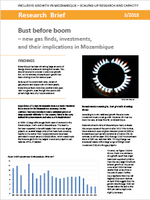
– New gas finds, investments, and their implications in Mozambique
Large flows of foreign investments have not been translated into a boom for the Mozambican economy. On the contrary, they have foreshadowed a sustained period of deep economic difficulty for the country. What is the story behind this phenomenon and what are its implications? Mozambique has been...

– Will local content do the trick?
Extractives and interlinked industries are expecting a boom in Mozambique. This could be good news for the country’s economy, in theory. But can extractives really work as a driver to diversify the Mozambican economy? It is unlikely that the extractives sector can any time soon be used to finance...
Working Paper
pdf
– Evidence from Mozambique
This paper estimates how private returns to education have evolved in the context of postconflict transformation in Mozambique. This has been characterized by rapid economic growth, significant expansion of the schooling system, but also limited structural change in a labour market dominated by...
Working Paper
pdf
– Reflections on investment surges and new gas
This paper is a sequel to an earlier paper that looked in broad terms at many of the issues that Mozambique faces today in managing its new extractive resources. The paper first describes the investment surge that has already been prompted by new gas discoveries in Mozambique. It then summarizes...

– Inquérito Base à Transição Ensino-Emprego dos Finalistas Universitários
O Inquérito à Transição Ensino-Emprego dos Finalistas Universitários visa dar resposta às preocupações do Governo de Moçambique e parceiros de desenvolvimento sobre o emprego jovem no país. O foco é aqui colocado na transição dos jovens, da educação para o mercado de trabalho. Quando se estuda esta...

– Results from a baseline survey
Before now, there has been no systematic study of the transition of university students as they finish their studies and enter the labour market. This Policy Brief summarises the findings of a baseline survey of such university students, who form the sample of a longitudinal tracking survey that...

The survey on the School-to-Work Transitions of University Graduates in Mozambique aims to respond to the concerns of the Government of Mozambique and development partners with respect to youth employment in the country. The focus is on the transition of young people from education to the labour...
Working Paper
pdf
– An overview
The construction sector value added in Mozambique grew at an average annual rate of 12.8 per cent in 1993–2015. Investment in the basic infrastructure of health, education, and housing improved families’ and communities’ living conditions. Investment in roads, communications, and office facilities...
Working Paper
pdf
In recent years, Mozambique has made international headlines for the significant hydrocarbon deposits found offshore. These have increased the country’s extractive resource endowments, in addition to its mining and onshore natural gas sector. It is expected that these industries will contribute to...
Working Paper
pdf
We analyse the multidimensional wellbeing of children aged 0–17 in Mozambique and find that 46.3 per cent can be considered multidimensionally poor. A substantial divide exists between urban and rural areas and between northern and southern provinces. We compare Mozambican children’s wellbeing with...
Blog
Baseline Survey on the School-to-Work Transitions of University Graduates in Mozambique will be launched on 4 September. This baseline survey is part of a larger study that will improve our understanding of the labour market position of higher education graduates in Mozambique. The information is...

– Lessons from international experience
Mozambique has seen a significant expansion of interest and investment in its extractive industries. New gas finds in the past ten years have led to expectations that these industries will contribute very significantly to the country’s future economic development and its long-term structural change...
Working Paper
pdf
– Investigating the qualitative–quantitative divide in Mozambique
This paper reflects on the relationship between economic (quantitative) and anthropological (qualitative) approaches to the analysis of poverty in developing countries. Drawing on detailed evidence from Mozambique, we argue that different research approaches do not merely see the same poverty from...
Journal Article
This peer-reviewed research is available free of charge. UNU-WIDER believes that research is a global public good and supports Open Access.
Part of Journal Special Issue
Regional Growth Opportunities
Journal Special Issue
This peer-reviewed research is available free of charge. UNU-WIDER believes that research is a global public good and supports Open Access.
This issue contains seven articles addressing the major changes underway in the integration of economies in southern Africa. This special issue is based on the UNU-WIDER project 'Regional growth and development in Southern Africa'. This project aims to develop, in conjunction with important research...
Blog
Mozambique’s manufacturing industry is facing many challenges. Nevertheless, we should not underestimate its linkages to the rest of the economy and its potential in terms of job creation and structural transformation. On 23 April 2018, the Inclusive Growth in Mozambique project hosted a public...
Blog
Mozambique has been facing macroeconomic difficulties since 2015. This has amplified the obstacles for micro, small and medium-sized manufacturing firms, but the actual problems lie deeper. The 2017 Survey of Mozambican Manufacturing Firms (IIM 2017) shows that Mozambique’s structural transformation...
Working Paper
pdf
Poverty declined substantially in Mozambique between 1996/97 and 2014/15. However, the recent economic crisis, characterized by a significant increase in domestic prices, may have dragged several households into poverty. Using consumer price index and 2014/15 household budged survey data, we...
Working Paper
pdf
– An application to Mozambique
In this paper, I quantify the contribution of a subpopulation to inequality. This is defined as the sum of the contributions of its members, with these contributions computed as the impact on inequality of a small increase in the population mass at each point of the distribution (using the...
Working Paper
pdf
– Lessons from international experience for Mozambique
In common with several other low-income African economies, in recent years Mozambique has seen a significant expansion of interest and investment in its long-established extractives industries. Huge new gas finds in particular have led to expectations that these industries will contribute very...

Weak supply chains, both in quantity and quality, impose logistical challenges on Mozambican manufacturing firms. The Mozambican regulatory and legal environment continue to be perceived as a hurdle. Regulatory barriers hinder firm capacity to export. Access to credit remains heavily constrained...
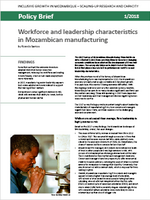
Firms that survived the economic downturn adopted restrictive human resources management, reducing the workforce and making it more flexible, which in turn made employment more vulnerable. In 2017, manufacturing sector leadership appears both more satisfied and more inclined to support the training...

– Inquérito as Indústrias Manufactureiras 2017 - Relatório Descritivo
Este relatório documenta as principais conclusões do Inquérito às Indústrias Manufactureiras Moçambicanas em 2017 (IIM 2017). A pesquisa foi planificada e implementada por pesquisadores do Grupo de Pesquisa em Economia do Desenvolvimento (DERG) da Universidade de Copenhague, United Nations...

– Descriptive report
This report documents the principal findings of the 2017 Survey of Mozambican Manufacturing Firms (IIM 2017). The survey was planned and implemented by researchers from the Development Economics Research Group (DERG) at the University of Copenhagen, the United Nations University World Institute for...
Working Paper
pdf
– Implications on gender inequalities within and across rural households
This paper analyses the implication of contract farming on gender inequalities in rural Mozambique. Contract farming is often considered one of the major tools of agribusiness development: it broadly includes those arrangements under which producers commit to provide a pre-defined quantity of crop...
Working Paper
pdf
This paper documents a 2015 Social Accounting Matrix (SAM) for Mozambique. The SAM is built using unpublished Instituto Nacional de Estatística (INE) industry-level production accounts, commodity-level supply–demand balances and a supply matrix, together with national accounts, National Directorate...

Mozambique has experienced rapid growth and reductions in poverty over the last twenty years. The latest poverty report showed a decline in the poverty rate of about 25 percentage points over the period 1996/97-2014/15, from about 70% to 46%. During the same the same period, many welfare indicators...
Blog
In the 1980s Mozambique was one of the poorest countries in the world. Since then, the country has recovered from civil war to grow by an average of 7% each year. According to the latest national poverty assessment, carried out as part of the ‘Inclusive growth in Mozambique’ project, the number of...

In late November 2017 more than 100 people gathered in Maputo, Mozambique, to participate in a joint reflection on poverty and inequality in the country. We had the opportunity to host eight international researchers who shared new evidence on inequality and multidimensional poverty in Mozambique...
Working Paper
pdf
In very poor countries, inequality often means that a small part of the population maintains living standards far above the rest. This is also true for educational inequality in Mozambique: only a small segment of the population has access to higher levels of education (there are 30 times as many...
Working Paper
pdf
– The case of Mozambique
In developing countries, women’s decisions concerning their children’s health depend on ‘empowerment’ concerning decision-making, husband/partner’s use of violence, woman’s attitude towards this violence, available information, and resources. We derive an empowerment indicator using the ‘fuzzy sets’...
Working Paper
pdf
– The case of four African countries
This paper investigates the levels and evolution of poverty in Malawi, Mozambique, Tanzania, and Zimbabwe using the decomposability properties of poverty measures based on a counting approach. We compare poverty measures such as the Alkire and Foster index with alternative poverty indices that are...
Working Paper
pdf
In this paper, we investigate the long-term trend of consumption inequality in Mozambique. We show that an imbalanced growth path disproportionally benefited the better-off and caused increasing inequality, especially in more recent years, curbing the necessary reduction in poverty. Using a...
Working Paper
pdf
We investigate the trend in the gender employment gap in the expanding non-subsistence sector of the economy in Mozambique, a country still characterized by a large subsistence agricultural sector. We show evidence that the gender gap has widened over time and we identify two factors strongly...
Working Paper
pdf
This paper provides practical tests for the robustness of multidimensional comparisons of well-being. Focussing on counting-type multidimensional poverty measures, I draw on the properties of positive Boolean threshold functions to prove that the space of feasible poverty definitions is finite and...

View the latest MOZMOD country report here. This report documents MOZMOD, the SOUTHMOD model developed for Mozambique. This work was carried out by the Ministry of Economy and Finance of Mozambique in collaboration with the project partners in the scope of the SOUTHMOD project. The results presented...
Blog
Mozambique, in common with many other developing countries, has achieved impressive increases in access to education. Since 2000, the number of children attending primary school has more than doubled, as have the number of schools. Enrolment into secondary school also has risen rapidly — in 2004...
Working Paper
pdf
The focus of this paper is the role played in rural contexts by contract farming agreements between smallholders and private investors. These contracts can take different forms, but in general are agreements under which producers commit to supply produce to a buyer firm. They are—at least on paper...
Working Paper
pdf
– Evidence from the Zambezi river in Mozambique
Prior to 2009, there was no direct road connection between the southern regions of Mozambique—where the capital city is located—and the more agriculturally-productive central and northern regions. In this paper, we leverage the opening of a major road bridge to identify the impact of enhanced...
Working Paper
pdf
– Rethinking our approach to the world’s most fragile states
Those fragile states whose stagnation is so tenacious despite generous aid programs, and substantial and costly interventions, are stuck in a ‘fragility trap.’ Caught in a low-level equilibrium, trapped states appear to be in a perpetual political and economic limbo that can last for years and in...

It’s early July and I’m back in Maputo, Mozambique, looking over the calm sea at the boats that fish the waters for the seafood that makes visiting this part of Africa such a treat. The sunset here is a delicate combination of pale turquoise, light grey, and warm pink. Coming from the Finnish summer...
Working Paper
pdf
– Accounting for underreported consumption
Household budget surveys in sub-Saharan Africa are designed to facilitate poverty measurement and may fail to fully capture consumption in wealthy households. As a result, inequality is likely underestimated. We address upper tier consumption underreporting by aligning consumption derived from...

View the latest MOZMOD country report here. This report documents MOZMOD, the SOUTHMOD model developed for Mozambique. This work was carried out by the Ministry of Economy and Finance of Mozambique in collaboration with the project partners in the scope of the SOUTHMOD project. The results presented...
Working Paper
pdf
– Political economy, trade, and policy environment
Expansion of biofuels production and consumption at the regional and national levels relies on both supportive energy prices and policy interventions. Despite enthusiasm for policy interventions to stimulate biofuel production in Southern African countries in the mid-2000s, the years since have seen...
Working Paper
pdf
– Competition in road transportation between Malawi, Mozambique, South Africa, Zambia, and Zimbabwe
Efficient transport links are critical to enhancing the integration of markets in Southern Africa. This paper assesses the structure of markets, competition, and prices and costs of road transportation between urban hubs in Malawi, Mozambique, South Africa, Zambia, and Zimbabwe. Key findings are...

Poverty is a multidimensional phenomenon involving things other than consumption — such as access to and quality of health and education, housing, possession of durable goods, freedom, and many other factors. The consumption and multidimensional poverty approaches are complementary: it is possible...
Journal Article
This peer-reviewed research is available free of charge. UNU-WIDER believes that research is a global public good and supports Open Access.
– The Case of Mozambican Manufacturing
Part of Journal Special Issue
Learning to Compete

– Significant progress but challenges remain
In 1990, Mozambique was one of the poorest countries in the world, with poverty estimated to reach 80% of the total population. At that stage, a Millennium Development Goal of reducing this proportion by half posed a very difficult target to meet. After the ‘war of destabilization’ in 1992, and...
Book Chapter
– Jobs and Welfare in an Agrarian Economy
From the book: Jobs For Development: Challenges and Solutions in Different Country Settings
Working Paper
pdf
This study discusses the potential for expanding cultivation of biofuel feedstock in Mozambique from several angles. Taking the case of sugarcane, it explores the potential to expand production, through exploring both biophysical factors and patterns of existing investment. We review recent...
Working Paper
pdf
Mozambique is one of the most promising African countries for producing biofuels and the national biofuel policy of 2009 identifies measures to incentivize biofuel production. Demand for biofuels in the Southern African Development Community is expected to increase over the next few years as 7 of...
Working Paper
pdf
In this study we analyze the gender gap in agricultural productivity in Mozambique applying the Oaxaca-Blinder decomposition approach on data from four agricultural surveys between 2002 and 2012. We find that female-headed households are on average substantially less productive (about 20 per cent)...
Working Paper
pdf
– An analysis of census data (1997–2007)
In this study we analyse the evolution of deprivation indicators and of a multidimensional poverty index using Mozambican census data for 1997 and 2007. We analyse deprivation levels according to eight different indicators reflecting housing conditions and access to public utilities/basic services...
Working Paper
pdf
– The case of Mozambique
All countries, especially developing countries with limited financial resources, face difficult decisions in prioritizing public funds for investment projects in order to achieve strategic public goals in the face of multiple demands. Effective investment often requires coordination between...
Working Paper
pdf
– Evidence from agricultural surveys
This paper studies the dynamics of the agricultural sector in Mozambique, focusing on the role of commercial farms. Using agricultural survey data from 2002 to 2012, we analyse the spatial distribution of large farms and identify factors influencing their location decisions. We find that the spatial...
Working Paper
pdf
– Mozambique country case study
Under the current international economic conditions, where Asian countries are strong competitors in the manufacturing commodities, low-income countries like Mozambique could attempt to compete in industries without smokestacks. Fruits and vegetables, agro-processing goods, and various tradable...
Working Paper
pdf
Child malnutrition continues to be a serious impediment to development both at the individual and national levels in many developing countries. In Mozambique, despite a high and sustained GDP growth, child malnutrition has been decreasing at a rather slow pace over the past 15 years. In this study...
Blog
There has been a serious deficit of good news in Mozambique for quite some time. The recent release of Mozambique’s Fourth Poverty Assessment, based on a large nationally representative household survey conducted in 2014-15, provides a welcome shift. The report finds that, relative to the prior...

The gains have been substantial and have occurred in both rural and urban zones. Policy advisers, development practitioners, and government representatives gathered on 25 October to discuss Mozambique’s progress over the past three decades with the release of Mozambique’s 4th National Poverty...
Working Paper
pdf
– Evidence from Mozambique
The impact of large commercial farms on neighbouring smallholders in low-income sub-Saharan Africa remains controversial. Bringing evidence to a largely anecdotal debate, we deploy a dataset covering all commercial farms in Mozambique, linking them to a nationally representative survey of...
Journal Article
This peer-reviewed research is available free of charge. UNU-WIDER believes that research is a global public good and supports Open Access.
– The Mozambican experience 2008/2009
A propitiously timed household survey carried out in Mozambique over the period 2008/2009 permits us to study the relationship between shifts in food prices and child nutrition status in a low income setting. We focus on weight-for-height and weight-for-age in different survey quarters characterized...
Journal Article
This peer-reviewed research is available free of charge. UNU-WIDER believes that research is a global public good and supports Open Access.
– Concepts and Application to Child Deprivation in Mozambique
This paper introduces a concept of inequality comparisons with ordinal bivariate categorical data. In our model, one population is more unequal than another when they have common arithmetic median outcomes and the first can be obtained from the second by correlation-increasing switches and/or median...

Mozambique, over the last two decades, has experienced explosive growth, with an average GDP growth rate of almost 8 percent between 1997-2015. Not only that, but, for the most part, Mozambique has a track record of solid macroeconomic policies, like controlling inflation, reducing current account...
Book Chapter
– Off-track or Temporarily Sidelined?
From the book:
Growth and Poverty in Sub-Saharan Africa
Working Paper
pdf
We broadly review the challenges encountered and choices made in the national assessments of consumption poverty using the 1996/97, 2002/03, and 2008/09 budget surveys. Efforts to maintain consistency with the previous survey imply that prior choices tend to be adopted in subsequent analyses...
Working Paper
pdf
– A feasibility study
This paper assesses the feasibility of developing a tax and benefit microsimulation model in Mozambique. Mozambique’s National Development Strategy 2015–35 commits to providing social security to three-quarters of poor and vulnerable households by 2035. Tax–benefit microsimulation can be used to...
Journal Article
This peer-reviewed research is available free of charge. UNU-WIDER believes that research is a global public good and supports Open Access.
We explore a novel first-order dominance (FOD) approach to poverty mapping and compare its properties to small-area estimation. The FOD approach uses census data directly, is straightforward to implement, is multidimensional allowing for a broad conception of welfare and accounts rigorously for...
Journal Article
This peer-reviewed research is available free of charge. UNU-WIDER believes that research is a global public good and supports Open Access.
– Zambezi basin and South Africa
Part of Journal Special Issue
Prospects for Renewable Energy in Africa
Working Paper
pdf
– Measuring real inequality using survey data from developing countries
This paper investigates how two effects drive wedges between nominal and real inequality estimates. The effects are caused by (i) differences in the composition of consumption over the income distribution coupled with differential inflation of consumption items; and (ii) quantity discounting effects...
Working Paper
pdf
– Cases from the Zambezi River Basin
We consider the interplay of climate change impacts, global mitigation policies, and the interests of developing countries to 2050. Focusing on Malawi, Mozambique, and Zambia, we employ a structural approach to biophysical and economic modeling that incorporates climate uncertainty and allows for...
Working Paper
pdf
Over the past twenty years, Mozambique has achieved remarkable progress in promoting macroeconomic growth and stability. Nonetheless, poverty rates remain high and labour market activity is dominated by smallholder farming. We use recent household survey data to dig into these trends and provide an...
Working Paper
pdf
We explore a novel first order dominance (FOD) approach to poverty mapping and compare its properties to small area estimation. The FOD approach uses census data directly; is straightforward to implement; is multidimensional allowing for a broad conception of welfare; and accounts rigorously for...
Blog
In the more than two decades since democratic elections signalled a new era in Mozambique, a great deal has been accomplished. Nearly all development indicators have improved – often substantially – relative to the miserable levels posted in the 1980s and 1990s. Headline economic growth has been...
Journal Article
This peer-reviewed research is available free of charge. UNU-WIDER believes that research is a global public good and supports Open Access.
– Evaluating the Case of Mozambique to 2050
Part of Journal Special Issue
Climate Change and the Zambezi River Valley
Journal Article
This peer-reviewed research is available free of charge. UNU-WIDER believes that research is a global public good and supports Open Access.
– A Study of Impacts and Adaptations in Malawi, Mozambique, and Zambia
Part of Journal Special Issue
Climate Change and the Zambezi River Valley

The articles in this special issue set forth a set of technical contributions that will improve the understanding of the impacts of climate change in developing countries. They are drawn from the Development Under Climate Change (DUCC) project carried out by UNU-WIDER of which the countries of the...
Research Brief
pdf
– Determining the impact of rising food prices
Evidence obtained from detailed household surveys in Mozambique during the 2008-09 food price shock reveals just how pronounced the impact of food price inflation can be on children’s overall nutrition status. Moderate and severe underweight prevalence in children in Mozambique is significantly...
Journal Article
This peer-reviewed research is available free of charge. UNU-WIDER believes that research is a global public good and supports Open Access.
Economic development in low income settings is often associated with an expansion of higher-value agricultural activities. Since these activities often bring new risks, an understanding of cropland decisions and how these interact with shocks is valuable. This paper uses data from Mozambique to...
Working Paper
pdf
– Off-track or Temporarily Sidelined?
Since 1994, a great deal has been accomplished. We argue that poverty reduction was temporarily sidelined in the 2000s. A series of shocks, especially the fuel and food price crisis of 2008, combined with poor productivity growth in agriculture and a weather shock, undermined progress in measured...
Journal Article
This peer-reviewed research is available free of charge. UNU-WIDER believes that research is a global public good and supports Open Access.
– The case of food prices in Mozambique
Changes in relative prices of commodities consumed in different shares across income groups can be expected to alter real income differentials between these groups. Using Mozambican household budget survey and price data from 2002/03 and 2008/09, we show that once relative price increases are...
Working Paper
pdf
– The Case of Food Prices in Mozambique
Changes in relative prices of commodities consumed in different shares across income groups can be expected to alter real income differentials between these groups. Using Mozambican household budget survey and price data from 2002/03 and 2008/09, we show that once relative price increases are...
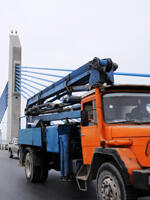
– Bad Luck or Bad Policy?
16 December 2014 John Page On 20 November 2014 the United Nations celebrated the 25th Africa Industrialization Day. But perhaps ‘celebrate’ is not exactly the right word. Africa’s experience with industrialization over the past quarter century has actually been disappointing. In 2010, sub-Saharan...
Journal Article
Part of Journal Special Issue
Aid and Institution-Building in Fragile States

– Evidence from a Group-Based Aid Project in Mozambique
This paper evaluates the impact of an intervention to improve farming techniques and food security in the Gaza area of rural Mozambique. We examine the impact of a group-based approach to technology adoption in subsistence agriculture, using panel data collected by our research team on over 200...
Working Paper
pdf
– The Case of Food Prices in Mozambique
Changes in the relative prices of commodities consumed in different shares across income groups are known to influence real measures of inequality. Using household budget survey and price data in Mozambique from 2002/03 and 2008/09, we show that accounting for the relative price changes driven by...
Working Paper
pdf
Mozambique benefits from environmental aid-related funds, but it is still unclear whether donor commitments render directly into projects that are copiously implemented for the purposes stated and what aid flows have actually been doing and are doing in the area of aid and environment in Mozambique...
Working Paper
pdf
Many public sector reforms in developing countries fail to make governments more functional. This is typically because reforms introduce new solutions that do not fit the contexts in which they are being placed. This situation reflects what has recently been called the ‘capability trap’ in...
Working Paper
pdf
This paper addresses the issue of poor data on Mozambican manufacturing firms. A new dataset (the merged manufacturing database) is merged from provincial industrial databases from each of Mozambique’s 11 provinces. The new dataset is assessed by comparing it to the latest manufacturing enterprise...
Working Paper
pdf
– The Case of Mozambican Manufacturing
In this paper, we aim to analyse the learning by exporting hypothesis in the Mozambican context. Due to the presence of the born-global phenomenon among exporters, we address the endogeneity introduced by self-selection by combining a generalized BO approach with results from traditional matching...
Working Paper
pdf
After the Second World War, Mozambique went through a series of transformations, from an incipient industrializing colonial society to an independent country with a central planned economy, plus a regional and internal war, and finally from 1994 onwards, a multi-party democracy with a mix of market...
Blog
28 February 2014 In this interview Sam Jones summarizes the findings of original UNU-WIDER work on the impact of aid on growth. Using data covering longer time frames, the overall picture is that aid amounting to 10% of GDP can, on average, lead to 1% higher GDP. Drawing on his experience of...
Book Chapter
From the book:
Food Price Policy in an Era of Market Instability
Research Brief
pdf
– A Trade-Off Between Governance and Democracy?
In Mozambique donors have shifted focus from project aid to budget support in an effort to reform the public sector and ‘justice, legality and public order’. While budget support has increased state capacity and helped Mozambique’s donor community find common ground, it has had a negative impact on...
Blog
10 December 2013 Tony Addison Our November-December Angle comes amid intense activity on our ReCom—Research and Communication on Foreign Aid—programme, which is drawing to a close. We also have the last of our ReCom results meetings, on the theme ‘Aid for Gender Equality’, taking place in Copenhagen...
Research Brief
pdf
The programme did lead participating households to use improved seeds. Food consumption scores did not improve after the programme. However during the programme participating households moved to more sustainable strategies to cope with food shortages. Fertilizer use improved by 20 per cent amongst...
Research Brief
pdf
Strong economic growth has not turned into poverty reduction in Mozambique due to stagnation in job creation. While the country sees great growth potential from natural resources, this industry is unlikely to generate many jobs as it is not labour-intensive. A fundamental challenge to job growth in...
Working Paper
pdf
Sharing similar colonial and post-independence civil war experiences, Mozambique and Angola’s development paths are often contrasted, with foreign aid-dependent Mozambique hailed a success compared to oil rentier Angola. This paper questions the so-called Mozambican miracle and contrasts it with...
Working Paper
pdf
This paper proposes a concept of inequality comparisons with ordinal multidimensional categorical data. In our model, one population is more unequal than another when they have common arithmetic median outcomes and the first can be obtained from the second by correlation-increasing switches and/or...
Blog
22 August 2013 Roger Williamson Given the high growth rates since 2000 and low labour costs, Africa could develop manufacturing industry, agro-processing, and services. But these cost advantages can easily be undermined by factors such as inadequate infrastructure, particularly power, transportation...
Research Brief
pdf
All climate scenarios considered result in reduced national welfare, if no reforms are enacted. If no policy changes are implemented, the present value of climate change costs up to 2050 are between US2 and US7 billion, for the scenarios considered in Mozambique. Climate change damages, while being...
Blog
9 May 2013 Tony Addison With May ending, we head into a very busy June for UNU-WIDER (and midsummer). Next week we are back in Stockholm at Sida for the ReCom results meeting on ‘Aid, climate change, and the environment’. Later this month the Learning to Compete conference—on industrial policy in...
Working Paper
pdf
The poverty mapping methodology for estimating welfare rankings from small areas has proven to be useful in guiding allocation of government funds, regional planning, and general policy formulation. Nevertheless, poverty mapping also suffers from a series of by now well recognized shortcomings. We...
Working Paper
pdf
Mozambique has achieved remarkable macroeconomic success over recent decades, boasting one of the world’s highest rates of GDP growth. However, absolute poverty remains persistent, spilling over into social unrest. To better understand the link between aggregate growth and household welfare, this...
Working Paper
pdf
– Evaluating the Case of Mozambique to 2050
We apply a probabilistic approach to the evaluation of climate change impacts in the Zambeze River Valley. The economic modeling relies on an economywide modeling approach. Taking a distribution of shocks as inputs, we create hybrid frequency distributions of the potential economic impacts of...
Working Paper
pdf
– Impacts and Adaptations for the Zambezi River Valley
The African Development Bank has called for US$40 billion per year over the coming decades to be provided to African countries to address development issues directly related to climate change. The current study addresses a key component of these issues, the effect of climate change on the road...
Working Paper
pdf
– Country Case Study of Mozambique
The 2007-09 price shocks affected in particular the prices of food commodities and fuel. As a consequence, Mozambique experienced reduced exports, more expensive imports and increased food and oil prices, contributing to the stagnant poverty rates registered in 2008/9. Our analysis finds, first...
Working Paper
pdf
This article considers the impact of sea level rise and storm surge on the port cities of Maputo and Beira in Mozambique. By combining a range of sea level rise scenarios for 2050 with the potential maximum storm surge level for the current 100-year storm, we analyze permanently inundated lands and...
Book Chapter
From the book:
Democratic Trajectories in Africa

– Comparative Path Analysis for Mozambique and Vietnam
While economic growth generally reduces income poverty, there are pronounced differences in the strength of this relationship across countries. Typical explanations for this variation include measurement errors in growth–poverty accounting and different compositions of economic growth. We explore...
Blog
Tony Addison This year has rushed by at speed. For UNU-WIDER it’s been a year of big successes. We will have published some 110 working papers by the end of December, up from 96 in 2011 (go here for the latest list). Recent working papers cover the topics of intergenerational mobility in India, food...
Journal Article
– A First Order Dominance Approach and Application to Child Poverty
We develop an approach for making welfare comparisons between populations with multidimensional discrete well-being indicators observed at the micro level. The approach is rooted in the concept of multidimensional first order dominance. It assumes that, for each indicator, the levels can be ranked...
Blog
Tony Addison UNU-WIDER is having a very active and successful autumn. Our climate change and development policy conference at the end of September attracted over 150 researchers and policy makers from across the world. Videos of this can be found online, as well as the papers, at www.wider.unu.edu...
Working Paper
pdf
A propitiously timed household survey carried out in Mozambique over the period 2008-09 permits us to evaluate the short-to-medium run relationship between sudden shocks to food prices and child nutrition status. We link local price inflation with child malnutrition status. We find that the...
Working Paper
pdf
– Evidence from a Group-Based Aid Project in Mozambique
This paper evaluates the impact of an integrated rural development programme on farming techniques and food security in the Gaza area of rural Mozambique. We examine the impact of a group-based approach, in a country with few impact evaluations of technology adoption in farming. Using self-collected...
Journal Article
– A Dynamic Stressor-Response Model
Part of Journal Special Issue
Climate Change and Economic Development
Journal Article
– The Case of Mozambique
Part of Journal Special Issue
Climate Change and Economic Development

The roots of development economics lie in the study of large-scale phenomena such as economic transformation. Climate change, as a global phenomenon, is drawing the attention of the profession back towards studies of transformational processes, including new considerations of adaptation and low...
Blog
Tony Addison With this issue, Angle returns refreshed from its Nordic summer break. The sun continues to shine on the Baltic, although it is getting noticeably chillier as we now head into the autumn. To keep our spirits up we have a very active programme of events for the rest of the year. This...
Blog
– A Win-Win Approach to Sustainable Development?
Danielle Resnick and James Thurlow The concept of ‘green growth’ is one which has understandable political currency, highlighted by its prominence in this year’s Rio+20 meeting hosted by the United Nations Conference on Sustainable Development. In promising to reconcile the goals of low-carbon and...

– the Case of Mozambique
We provide a comprehensive approach for analyzing the evolution of poverty using Mozambique as a case study. Bringing together data from disparate sources, we develop a novel 'back-casting' framework that links a dynamic computable general equilibrium model to a micro-simulation poverty module. This...
Displaying 288 of 334 results
 Join the network
Join the network

